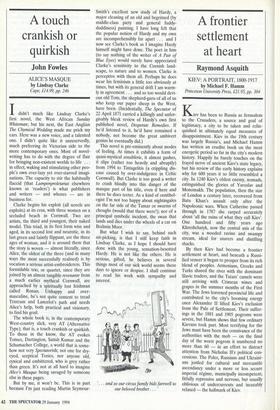A touch crankish or quirkish
John Fowles
ALICE'S MASQUE by Lindsay Clarke Cape, £14.99, pp. 246 Ididn't much like Lindsay Clarke's first novel, the West African Sunday Whiteman; but his next, the East Anglian The Chymical Wedding made me prick my ears. Here was a new voice, and a talented one. I didn't quite like it unreservedly, much preferring its Victorian side to the more contemporary ones. Most of novel- writing has to do with the degree of flair for bringing non-existent worlds to life . . . in effect, waking and stimulating other peo- ple's own ever-lazy yet ever-starved imagi- nations. The capacity to stir the habitually flaccid (that Lumpenproletariat elsewhere known as 'readers') is what publishers and writers — and whores — are in business for.
Clarke begins his exploit (all novels are exploits) at its crux, with three women on a secluded beach in Cornwall. Two are artists, the third and youngest, their naked model. This triad, in its first form wise and aged, in its second lost and neurotic, in its last green and faintly flippant, are the three ages of woman, and it is around them that the story is woven — almost literally, since Alice, the oldest of the three (and in many ways the most successfully realised) is by vocation a serious artist-embroideress. This formidable trio, or quartet, since they are joined by an almost tangible revenante from a much earlier mythical Cornwall, are approached by a spiritually lost Irishman called Ronan. Unhappy and over- masculine, he's not quite content to tread Tristram and Lancelot's path and needs Alice's help, both practical and visionary, to find his grail.
The whole book is, in the contemporary West-country slick, very AT (Alternative Type); that is, a touch crankish or quirkish. To those in the know, the AT evokes Totnes, Dartington, Satish Kumar and the Schumacher College, a world that is some- how not very Spectatorish; not one for dry- eyed, sceptical Tories, nor anyone old, cynical and embittered, who is grey rather than green. It's not at all hard to imagine Alice's Masque being savaged by someone else in these pages.
But by me, it won't be. This is in part because I'm just reading Martin Seymour- Smith's excellent new study of Hardy, a major cleaning of an old and begrimed (by middle-class piety and general fuddy- duddiness) painting. I have long felt that the popular notion of Hardy and my own are incomprehensibly far apart . . . and I now see Clarke's book as I imagine Hardy himself might have done. The poet in him (to say nothing of the writer of A Pair of Blue Eyes) would surely have appreciated Clarke's sensitivity to the Cornish land- scape, to nature and to women. Clarke is perceptive with them all. Perhaps he does wear his feminism a little too obviously at times, but with its general drift I am warm- ly in agreement . . and so too would devi- ous old Tom, the shepherd-guru of all of us who keep our paper sheep in the West, have been. (Incidentally, The Spectator of 22 April 1871 carried a killingly and unfor- givably bleak review of Hardy's own first published novel, Desperate Remedies. If he'd listened to it, he'd have remained a nobody, not become the great ambivert genius he eventually did.) This novel is pre-eminently about modes of feeling. At times it exhibits a form of quasi-mystical sensiblerie, it almost gushes, it slips (rather too heavily and abruptly) from 1994 to Tintagelitis (a crippling dis- ease caused by over-indulgence in Celtic Cornwall). But Clarke is too good a writer to crash blindly into this danger of the masque part of his title, even if here and there he does teeter. As a kind of ornithol- ogist I'm not too happy about nightingales on the far side of the Tamar or swarms of choughs (would that there were!); nor of a principal symbolic incident, the swan that lands and dies under the wheels of a car on Bodmin Moor.
But what I wish to say, behind such nit-picking, is that I still keep faith in Lindsay Clarke, as I hope I should have done with the young, sensation-besotted Hardy. He is not like the others. He is serious, gifted, he believes in several things most of our sick world seems these days to ignore or despise. I shall continue to read his work with sympathy and interest.
. . . and so our circus family bids farewell to our beloved brother . . . '


































































 Previous page
Previous page